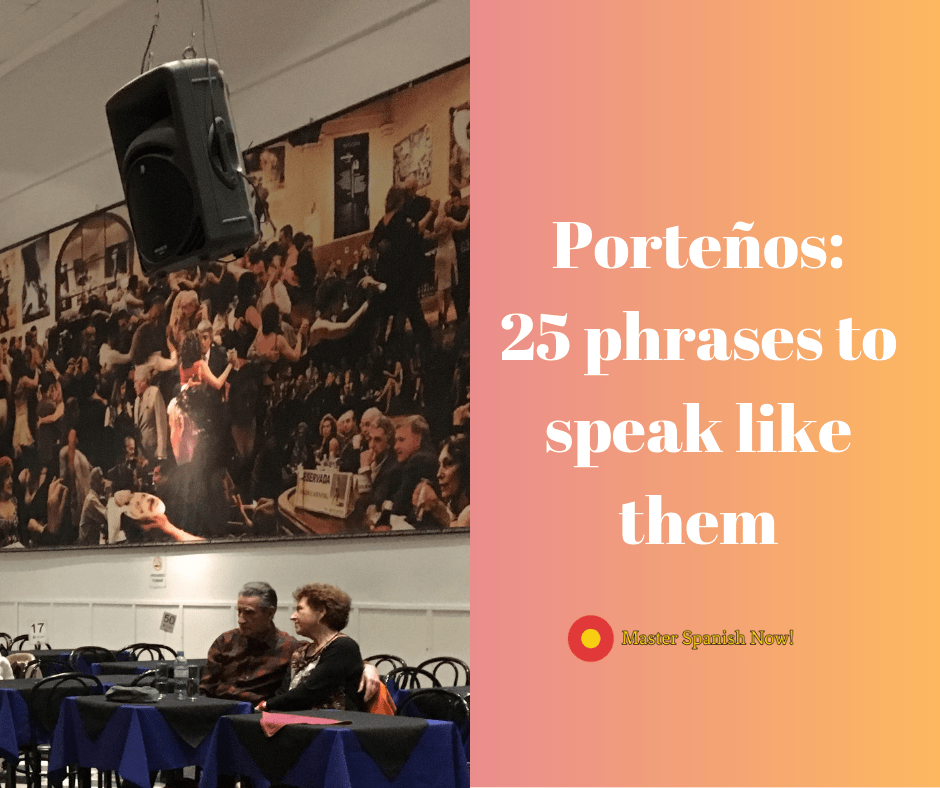Argentinian Spanish (Argentino) is different from Español (Spanish) spoken in Spain or other Latin American countries. The porteños (Buenos Aires citizens) speak with a specific accent and use a lot of Lunfardos (Argentine slang).
Here we explain 25 interesting vocabulary/phrases in Argentinian Spanish which will help you to understand porteños better during your next tango trip to Buenos Aires! Saying them on the street will make you sound super porteños!
- 1. Chamullar/chamuyar
- 2. Se me complicó
- 3. Che boludo
- 4. ¿Qué onda?
- 5. Re
- 6. Capo
- 7. El flaco
- 8. Genio
- 9. Dame bola
- 10. Bajate de la moto
- 11. Bondi
- 12. La posta
- 13. Quilombo
- 14. Bajón
- 15. Alto guiso
- 16. Dale, buenismo.
- 17. Tiene pinta de…
- 18. Tiene pinta
- 19. Le importa un comino.
- 20. Va al frente.
- 21. Mandar al frente
- 22. Canchero
- 23. Careta
- 24. Ojete
- 25. Dame cinco
25 phrases Porteños speak everyday
1. Chamullar/chamuyar
The porteños are good at making people to fall head over heels to them by sweet-talking, and the sweet-talking act is called “chamullar/chamuyar”, and the sweet-talker is called “chamullero/chamuyero or chamullera/chamuyera”.
2. Se me complicó
Very often a porteño would create a semi-true story to help him/her to get away from a responsibility. “Se me complicó” (It’s complicated) is an expression often used in such story-telling.
3. Che boludo
“Che” is a word similar to “hey” and “boludo” is an insulting word meaning “idiot”, but “Che boludo” (for man; “Che boluda” is for female) is often used by close friends to refer to one another.
4. ¿Qué onda?
In Argentina, instead of asking “¿Cómo estás?” (How are you?) as in other Hispanic countries, people ask “¿Qué onda?, “¿Qué haces? Or “Cómo va/andás?
5. Re
Argentinians are known for exaggeration, but they use a minimalist approach: adding a “re” in front of everything e.g. “re linda”, “ re bueno”, “re malo” etc.
6. Capo
When calling out a stranger on the street, instead of saying “¡Señor!” (Sir!), Argentinians use capo/jefe (both mean boss) or maestro (master).
7. El flaco
Talking about someone who’s not there, porteños would refer to him as “El tipo” (the guy); “El pibe”/ “bepi” (the kid); “El flaco” (the skinny) or “El chabón” (the idiot, in a friendly manner). For her would be “La piba”, “La flaca” or “La chabóna”…
8. Genio
“Genio” (genius), “maestro” (master) or “idolo” (idol) are the highest honor an Argentinian gives to someone he admires.
9. Dame bola
If a porteño want to get your attention, he will yell at you “¡Che, dame bola” (Hey, give me a ball.)
10. Bajate de la moto
When an Argentinian wants you to calm down, he’d say “Bajate de la moto” (get down from the motorcycle)
11. Bondi
In Buenos Aires they don’t call a bus “un autobus” but “un bondi/colectivo”.
12. La posta
If you want a porteño to tell you the truth, instead of saying “¡Dime la verdad!” (Tell me the truth!), say “¡Canta/Dice la posta!” (say the truth!) or simply “¡La posta! (be straight with me!)”.
13. Quilombo
Poreños wouldn’t say “Tengo un problema” (I have a problem), but “Estoy metido en quilombos.” (I’m in a mess).
14. Bajón
In a difficult situation, an Argentinian’d say “Es un bajón.” (It’s a slump) or “Estoy bajoneado” (I’m depressed).

15. Alto guiso
An Argentinian wouldn’t say he has prepared “un gran estofado” (a great stew), but “un alto guiso”.
16. Dale, buenismo.
When you make a suggestion to a Porteño, he won’t simply accept it, he will say “¡Dale, buenismo!” (Okay, excellent!).
17. Tiene pinta de…
When an Argentino wants to express his scepticism, instead of “Parece que…” (It looks like…), he would say “Tiene pinta de…”.
18. Tiene pinta
However, “Tiene pinta.” is an expression often used by people comment on someone’s appearance, meaning “He/she is good looking.”.
19. Le importa un comino.
For something that disinterest a Porteño, he’d say “Le importa un comino/pepino.” (I don’t give a damn).
20. Va al frente.
A brave person to an Argentinian is someone who “Va al frente.” (goes to the front) or “Se manda” (he/she orders).

21. Mandar al frente
But on the other hand, “Mandar al frente.” means a person sending the other or leaving him to a risk without warning.
22. Canchero
Someone who talks like he knows everything is called “Re canchero.” (Very experienced, in an ironic way). People will say to him “Bajate del pony.” (Get down from the pony.)
23. Careta
Instead of saying a person is “Un mentiroso” (a liar) or “Un hipócrita” (a hypocrite), Argentinian says “Un careta.” (A “careta” literally means “a mask”).
24. Ojete
In Buenos Aires people don’t say “Tienes suerte.” (You are lucky), but “Tenés ojete” or “Tenés flor de ojete.” (You are lucky).
25. Dame cinco
When you want to ask someone to wait for you for 5 minutes, you can say “Dame cinco” (Give me five.)
Want to learn Spanish for tango? Book a trial class for USD7 only and learn with our Spanish teachers who are tangueras from Buenos Aires!
Check out our books on Amazon:


